Fleurs du Mal Magazine


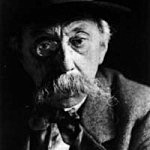
Emile Verhaeren
Chanson de fou (1)
Le crapaud noir sur le sol blanc
Me fixe indubitablement
Avec des yeux plus grands que n’est grande sa tête ;
Ce sont les yeux qu’on m’a volés
Quand mes regards s’en sont allés,
Un soir, que je tournai la tête.
Mon frère ? – il est quelqu’un qui ment,
Avec de la farine entre ses dents ;
C’est lui, jambes et bras en croix,
Qui tourne au loin, là-bas,
Qui tourne au vent,
Sur ce moulin de bois.
Et Celui-ci, c’est mon cousin
Qui fut curé et but si fort du vin
Que le soleil en devint rouge ;
J’ai su qu’il habitait un bouge,
Avec des morts, dans ses armoires.
Car nous avons pour génitoires
Deux cailloux
Et pour monnaie un sac de poux,
Nous, les trois fous,
Qui épousons, au clair de lune,
Trois folles dames, sur la dune.
Emile Verhaeren (1855-1916) poésie
fleursdumal.nl magazine
More in: Archive U-V, Verhaeren, Emile
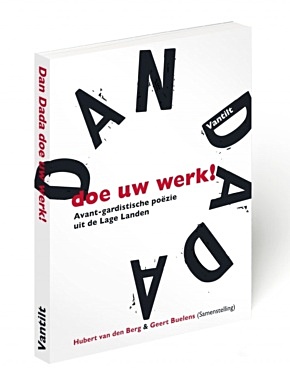 Dan dada doe uw werk!
Dan dada doe uw werk!
Avant-gardistische poëzie uit de Lage Landen
Redactie: Geert Buelens, Hubert van den Berg
‘Dan dada doe uw werk!’ Met deze woorden besluit I.K. Bonset in 1921 in De Stijl een tirade tegen pogingen om ‘de kanselliteratuur van vóór ’80’ in het interbellum nieuw leven in te blazen. Of dada het ‘predikantenpathos’ inderdaad wist uit te drijven uit de Nederlandstalige literatuur, valt te betwijfelen. Wel lieten dada en andere avant-gardistische ‘ismen’ hun onmiskenbare sporen na in de Nederlandstalige poëzie.
In Dan dada doe uw werk! presenteren samenstellers Hubert van den Berg en Geert Buelens een dwarsdoorsnede van de poëtische avant-garde in de vroege twintigste eeuw in Nederland en Vlaanderen. De bloemlezing bevat werk van onder anderen Piet Mondriaan, I.K. Bonset, Paul van Ostaijen, Herman van den Bergh, Hendrik de Vries, H. Marsman, Pierre Kemp, Kurt Schwitters, Antony Kok, Victor J. Brunclair, Til Brugman, Gaston Burssens, A.C. Willink, Michel Seuphor en H.N. Werkman.
Dan dada doe uw werk! is het laatste deel in de Dada-reeks van Uitgeverij Vantilt. Eerder verschenen Tenderenda de Fantast van Hugo Ball, In den beginne was Dada van Raoul Hausmann, 7 dadamanifesten van Tristan Tzara, En Avant dada van Richard Huelsenbeck, Een avond in Cabaret Voltaire van Hans Arp e.a., Jezus Christus Quibus van Francis Picabia en Apologie van de luiheid en Pan Pan voor de Poeper van de Neger Naakt & Bar Nicanor van Clément Pansaers.
Geert Buelens, Hubert van den Berg
(Redactie)
Vormgever: Martien Frijns
ISBN 9789460041617
paperback
15 x 22 cm
248 pagina’s
Uitgeverij Vantilt
€ 19,95
fleursdumal.nl magazine
More in: - Book News, Antony Kok, Antony Kok, Baargeld, Johannes Theodor, Ball, Hugo, Cendrars, Blaise, Dada, DADA, Dadaïsme, De Stijl, Doesburg, Theo van, Ernst Jandl, Essays about Van Doesburg, Kok, Mondriaan, Schwitters, Milius & Van Moorsel, Evert en Thijs Rinsema, EXPRESSIONISM, DADA & DE STIJL, SURREALISM, Freytag-Loringhoven, Elsa von, Jandl, Ernst, Kok, Antony, Kurt Schwitters, Marcel Duchamp, Ostaijen, Paul van, Pansaers, Clément, Paul van Ostaijen, Piet Mondriaan, Schwitters, Kurt, Theo van Doesburg, Theo van Doesburg, Theo van Doesburg (I.K. Bonset), Tzara, Tristan, Werkman, Hendrik Nicolaas
 Draag jij je gedicht voor tijdens de Nationale Herdenking op 4 mei?
Draag jij je gedicht voor tijdens de Nationale Herdenking op 4 mei?
Wil jij je gedicht voordragen aan de koning en koningin, minister-president, oorlogsveteranen en bijna 3 miljoen kijkers? Doe dan mee aan de jaarlijkse dichtwedstrijd Dichter bij 4 mei. Deze wedstrijd wordt georganiseerd in samenwerking met het Nationaal Comité 4 en 5 mei en vindt ieder jaar in een andere provincie plaats. Dit jaar is dat de provincie Noord-Holland.
Open Poëzieworkshop
Doet jouw school niet mee aan het project Dichter bij 4 mei? Wil je toch meedoen, ben je tussen de 14 en 19 jaar oud en woonachtig in de provincie Noord-Holland? Geef je op voor de open poëzieworkshop op zaterdag 14 januari 2017 in Fort aan de Sint Aagtendijk in Beverwijk. Of stuur voor 1 februari 2017 maximaal drie gedichten naar 4mei@poeziepaleis.nl.
Dichter bij 4 mei
Dichter bij 4 mei is een poëziewedstrijd voor jongeren tussen de 14 en 19 jaar rondom het thema ‘herdenken’. De winnaar van de dichtwedstrijd mag zijn of haar gedicht voordragen op de Dam tijdens de Nationale Herdenking op 4 mei. De andere drie winnaars mogen hun gedicht voordragen tijdens de herdenkingen in de voormalige kampen Westerbork, Vught en Amersfoort.
Thema: herdenken
“Tijdens de Nationale Herdenking op 4 mei herdenken wij allen – burgers en militairen – die in het Koninkrijk der Nederlanden of waar dan ook ter wereld zijn omgekomen of vermoord sinds het uitbreken van de Tweede Wereldoorlog, in oorlogssituaties en bij vredesoperaties”
Door de Nationale Herdenking op de Dam en op andere plekken in het land komt iedereen Dichter bij 4 mei.
 Jouw gedicht op de Dam?
Jouw gedicht op de Dam?
Het Poëziepaleis zoekt samen met het Nationaal Comité 4 en 5 mei een dichttalent dat op 4 mei op de Dam zijn of haar gedicht wil voordragen. Wanneer mag je meedoen?
– Je bent tussen de 14 en 19 jaar;
– Je zit op het vmbo/ havo/ vwo/ MBO of ROC;
– Je bent woonachtig in de provincie Noord-Holland.
Hoe kun je meedoen?
Wil jij kans maken op één van de finaleplaatsen, stuur dan voor 1 februari 2017 maximaal drie gedichten naar 4mei@poeziepaleis.nl en zorg dat je gedicht voldoet aan de volgende punten:
– Het thema is herdenken;
– Het gedicht is maximaal 25 regels lang;
– Het taalgebruik is passend;
– Het gedicht is geschikt om voor te dragen.
# Meer informatie op website poëziepaleis
fleursdumal.nl magazine
More in: Art & Literature News, AUDIO, CINEMA, RADIO & TV, Children's Poetry, In Memoriam, Literary Events, POETRY ARCHIVE, WAR & PEACE
 Ben jij een poëzie- en podiumtalent tussen de 15 en 18 jaar?
Ben jij een poëzie- en podiumtalent tussen de 15 en 18 jaar?
Het Poëziepaleis is op zoek naar een nieuwe Jonge Dichter des Vaderlands. Ben jij het poëzietalent dat wij zoeken en ben je tussen de 15 en 18 jaar? Vind jij het leuk om in de spotlights te staan? Doe dan nú mee met de wedstrijd!
Poëziepaleis zoekt talent!
Het Poëziepaleis zoekt een nieuwe Jonge Dichter des Vaderlands 2017 – 2019 De Jonge Dichter des Vaderlands schrijft gedichten over actuele gebeurtenissen en treedt geregeld op. Nieuwsgierig? Bekijk dan de gedichten van Maaike Rijntjes (JDdV 2014-2016).
Wil je tips voor het schrijven van gedichten? Neem dan een kijkje bij Tips & Inspiratie.
Hoe kun je meedoen?
Je stuurt voor 5 februari 2017 minimaal vijf gedichten in via het wedstrijdformulier. Vanzelfsprekend schrijf jij deze gedichten zelf. Bij de inzending motiveer je waarom juist jij dé nieuwe Jonge Dichter des Vaderlands bent.
 Wanneer mag je meedoen?
Wanneer mag je meedoen?
– Je bent 15 t/m 18 jaar en zit op de middelbare school;
– Je bent bereid om je de komende twee jaar in te zetten als Jonge Dichter des Vaderlands;
– Je bent in staat (en vindt het leuk) om gedichten in opdracht te schrijven over maatschappelijke onderwerpen;
– Je vindt het leuk om in de spotlights op een podium te staan en je bent bereid hiervoor tijd vrij te maken.
Wat kun je winnen?
Twee jaar lang de eer hebben de titel te dragen, coaching door Dichter des Vaderlands Anne Vegter, fantastische optredens op verschillende festivals en een persoonlijk prijzenpakket. Genoeg redenen om mee te doen!
# Meer informatie op website poëziepaleis
fleursdumal.nl magazine
More in: Art & Literature News, City Poets / Stadsdichters, Kinderstadsdichters / Children City Poets, MODERN POETRY, POETRY ARCHIVE
 Dada
Dada
Een geschiedenis
Auteur: Hubert van den Berg
Dada. Een geschiedenis beschrijft het ontstaan en de ontwikkeling van de internationale dadabeweging, zoals die zich manifesteerde in onder andere Zürich, Berlijn en Parijs. Bijzondere aandacht is er voor dada-Nederland en dada-België en de belangrijkste hoofdrolspelers daar: Theo van Doesburg/I.K. Bonset, H.N. Werkman, Piet Mondriaan, Clément Pansaers en Paul van Ostaijen.
Dada wordt vaak een antibeweging genoemd. Dada. Een geschiedenis herziet dit eenzijdige, negatieve beeld. In werkelijkheid was dada zowel een synthese van vooroorlogse avantgardistische ‘ismen’ – kubisme, futurisme en expressionisme –, als de opmaat tot het surrealisme en constructivisme. Dada is een cruciale etappe in de ontwikkeling van de moderne kunst en literatuur van de twintigste eeuw, waarvan de echo nog altijd klinkt.
Dada. Een geschiedenis is rijk in kleur geïllustreerd. Een kroniek van de belangrijkste dadakunstenaars, -kunstwerken, -evenementen en -gebeurtenissen completeert het boek.
Hubert van den Berg:
Dada. Een geschiedenis
Vormgever: Martien Frijns
ISBN 9789075697971,
paperback
17 x 22 cm
geïllustreerd
304 pagina’s
Uitgeverij Vantilt
€ 29,95
fleursdumal.nl magazine
More in: - Book News, Antony Kok, Art & Literature News, Baargeld, Johannes Theodor, Ball, Hugo, Dada, DADA, Dadaïsme, DANCE & PERFORMANCE, De Stijl, Essays about Van Doesburg, Kok, Mondriaan, Schwitters, Milius & Van Moorsel, Evert en Thijs Rinsema, Freytag-Loringhoven, Elsa von, Kok, Antony, Kurt Schwitters, LITERARY MAGAZINES, MUSIC, Ostaijen, Paul van, Pansaers, Clément, Piet Mondriaan, Satie, Erik, Schwitters, Kurt, THEATRE, Theo van Doesburg, Theo van Doesburg, Tzara, Tristan, Werkman, Hendrik Nicolaas

TILT Festival
29 maart – 1 april 2017
Tilburg
de eerste namen:
Yves Petry,
Astrid Roemer,
De Optimist
tiltfestival.nu
fleursdumal.nl magazine
More in: - Book News, Art & Literature News, AUDIO, CINEMA, RADIO & TV, DANCE & PERFORMANCE, MUSIC, THEATRE, Tilt Festival Tilburg
Gedichtendag 2017 (26 januari)

Poëzieweek 2017 (26 januari t/m/ 1 februari)
 Opening Poëzieweek 2017 (26 januari t/m/ 1 februari)
Opening Poëzieweek 2017 (26 januari t/m/ 1 februari)
Met Gedichtendag gaat op de laatste donderdag van januari traditiegetrouw de Poëzieweek van start. Gedichtendag, sinds 2000 georganiseerd door Poetry International Rotterdam, is hét poëziefeest van Nederland en Vlaanderen. Poëzieliefhebbers in Nederland en Vlaanderen organiseren die dag een grote diversiteit aan eigen poëzieactiviteiten en ook de media klinken die dag een stuk poëtischer.
Voor de enorme hoeveelheid optredens, publicaties, poëzieprijzen, -programma’s en -activiteiten is één dag simpelweg veel te kort!
Verspreid poëzie op social media
Breng poëzie in uw leven! Laat u inspireren door de foto-gedichten en deel het op social media met #Gedichtendag. Wijs vrienden en contacten op website poezieweek.com
Lees ook poëzie op website: fleursdumal.nl magazine
Dicht mee!
More in: #Archive A-Z Sound Poetry, Art & Literature News, CLASSIC POETRY, CONCRETE , VISUAL & SOUND POETRY, EDITOR'S CHOICE, EXPERIMENTAL POETRY, LIGHT VERSE, Literary Events, MODERN POETRY, POETRY ARCHIVE, Poëzieweek, PRESS & PUBLISHING, STREET POETRY, The talk of the town

Humor en poëzie? ”Jawel”, zegt Jules Deelder (Rotterdam-Overschie, 1944), die het Poëziegeschenk 2017 zal schrijven. Met het thema humor in de Poëzieweek 2017 komt er aandacht voor gedichten die op de lachspieren werken, uit hilariteit, herkenbaarheid of uit ironie. Humor is in Deelders poëzie in ieder geval geen curiosum. Deze Nederlandse dichter van een omvangrijk oeuvre staat in binnen- en buitenland bekend om zijn memorabele performances, waarbij de Beat Generation nooit veraf lijkt.
Aan de vooravond van de Poëzieweek wordt in Nederland voor de 23ste keer de VSB Poëzieprijs uitgereikt en in Vlaanderen de Herman de Coninckprijs. De Poëzieweek start op donderdag 26 januari in Vlaanderen en Nederland met Gedichtendag en loopt t/m woensdag 1 februari; de prijsuitreiking van de Turing Gedichtenwedstrijd. Tijdens de Poëzieweek krijgen de klanten van de boekhandel bij aankoop van € 12,50 aan poëzie het Poëziegeschenk cadeau.
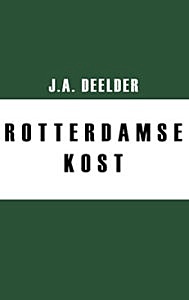 Gedichten worden in onze contreien eerder met ernst dan met humor geassocieerd. Het verdriet is eindeloos en de liefde hopeloos. Toch wordt er ook heel wat afgelachen in poëtenland. Soms is er de luide bulderlach bij een kolderiek nonsensgedicht, vaak is er ook een grijns van herkenning. De verwarrende situatie die de dichter beschrijft, hebben we zelf allemaal ook meegemaakt. Humor in poëzie kan ook wat ongemakkelijk zijn: valt hier wel om te lachen? Dichters gebruiken humor ook in de vorm van ironie of spot om een maatschappelijke wantoestand aan te klagen. Humor is bovenal een manier om met de meerduidigheid van de dingen om te gaan en dat is bij poëzie niet anders…
Gedichten worden in onze contreien eerder met ernst dan met humor geassocieerd. Het verdriet is eindeloos en de liefde hopeloos. Toch wordt er ook heel wat afgelachen in poëtenland. Soms is er de luide bulderlach bij een kolderiek nonsensgedicht, vaak is er ook een grijns van herkenning. De verwarrende situatie die de dichter beschrijft, hebben we zelf allemaal ook meegemaakt. Humor in poëzie kan ook wat ongemakkelijk zijn: valt hier wel om te lachen? Dichters gebruiken humor ook in de vorm van ironie of spot om een maatschappelijke wantoestand aan te klagen. Humor is bovenal een manier om met de meerduidigheid van de dingen om te gaan en dat is bij poëzie niet anders…
J.A. Deelder zette zijn eerste stappen in zijn carrière als performer in 1966. Na zijn poëziedebuut Gloria Satoria bij De Bezige Bij volgden nog vele bundels met als meest recente publicaties Tussentijds (2008), Ruisch (2011), Het graf van Descartes (2013) en Dag en nacht (2014). In zijn vaak absurdistische, maar steeds glasheldere poëzie wordt de jazz haast tastbaar. De onderwerpen die Deelder aansnijdt zijn de Tweede Wereldoorlog, Duitsland, Rotterdam, jazz en het leven van Deelder zelf. In 1982 debuteerde Deelder als prozaïst met Schöne Welt. Hierna verschenen een groot aantal verhalenbundels en gelegenheidsuitgaven waaronder Deelderama (2001), Swingkoning (2006) en Deelder lacht (2007). Deelder ontving voor zijn gehele oeuvre de Anna Blaman Prijs (1988), de Johnny Van Doorn-prijs voor de gesproken letteren (1999), en de Tollensprijs (2005). In 2005 mocht hij ook een Edison voor zijn cd Deelder blijft draaien in ontvangst nemen. 
De Poëzieweek is een Nederlands-Vlaamse samenwerking van Stichting Poetry International, Poëziecentrum, Iedereen Leest Vlaanderen, Stichting Lezen Nederland, Awater, Poëzieclub, Het Literatuurhuis, Wintertuin, SLAG, Taalunie, SSS, het Nederlands Letterenfonds, Vlaams Fonds voor de Letteren, Turing Foundation, VSBfonds, Boek.be en de CPNB. Met de bundeling van deze activiteiten willen de organisatoren een groter bereik creëren voor poëzie.
fleursdumal.nl magazine
More in: Archive C-D, Art & Literature News, Jules Deelder, LIGHT VERSE, Literary Events, Poëzieweek
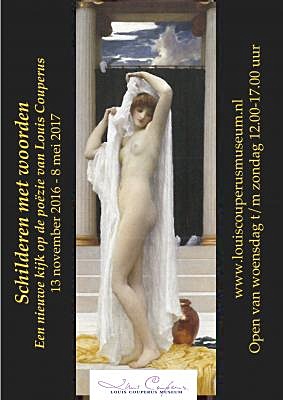 Nieuwe tentoonstelling Schilderen met woorden. Een nieuwe kijk op de poëzie van Louis Couperus. 13 november 2016 – 8 mei 2017 in het Louis Couperus Museum.
Nieuwe tentoonstelling Schilderen met woorden. Een nieuwe kijk op de poëzie van Louis Couperus. 13 november 2016 – 8 mei 2017 in het Louis Couperus Museum.
Gedurende een groot deel van zijn leven (om precies te zijn 25 jaar) heeft Louis Couperus poëzie geschreven. Tot nu toe is er te weinig aandacht geschonken aan dit onderwerp.
Deze winter visualiseert het Louis Couperus Museum de dichtkunst van de Haagse schrijver door middel van afbeeldingen en beeldhouwwerk waardoor de schrijver was geïnspireerd.
Tentoonstelling
Aan de wanden worden representatieve gedichten of citaten daaruit groot weer gegeven, op textiel afgedrukt. Bij elk fragment komt een afbeelding te hangen die inhoudelijk in verband staat met het betreffende gedicht. Reproducties van schilderijen – in een enkel geval zelfs een beeldhouwwerk – hebben Couperus soms regelrecht tot voorbeeld gediend. Ook de doorwerking van zijn poëzie in zijn proza komt aan bod. Op de televisiemonitor is een voordracht van zijn dichtkunst door acteur Joop Keesmaat te zien en te horen.
De expositie is gecentreerd rond 5 thema’s uit Couperus’ poëzie. Allereerst de figuur van Petrarca die hem de Laura-cyclus in gaf. Ten tweede de salon-schilderkunst uit de negentiende eeuw en daarmee samenhangend gedichten waarin Couperus bijna letterlijk ‘met woorden schildert’. Vervolgens het beeld Alba van de Friese beeldhouwer Pier Pander, dat Couperus in het gelijknamige sonnet bezong. Dan de wereld van de Arthurlegenden die hem zo boeide, en de door Italië geïnspireerde gedichten. De ‘aardse Couperus’ (Arjan Peters) komt in de ‘sonnettenroman’ Endymion aan bod. Hierin vereenzelvigt Couperus zich met een volksjongen die in de klassieke metropool Alexandrië allerlei avonturen beleeft. Dit wordt op eigentijdse wijze gevisualiseerd door een stripverhaal van de hand van Mees Arnzt, een student van de Koninklijke Academie voor Beeldende Kunsten.
Verantwoording
De tentoonstelling wordt ingericht door gastconservator Frans van der Linden, medewerker van het Louis Couperus Museum, winnaar van de Couperuspenning en samensteller van het boekje O gouden, stralenshelle fantazie! Bloemlezing uit de poëzie van Louis Couperus (in de Prominentreeks van Uitgeverij Tiem, 2015).
De expositie wordt mede mogelijk gemaakt dankzij een bijdrage van het Prins Bernhard Cultuurfonds.
schilderen met woorden.
een nieuwe kijk op de poëzie van Couperus
13 november 2016 – 8 mei 2017
Louis Couperus Museum
Javastraat 17
2585 AB Den Haag
070-3640653
info@louiscouperusmuseum.nl
Openingstijden
Woensdag t/m zondag 12.00-17.00 uur
Voor groepen ook op afspraak
Het gehele jaar door geopend, met uitzondering van 1ste en 2de Kerstdag en Nieuwjaarsdag
Toegankelijk voor gehandicapten
# Meer informatie op website van het Couperus Museum
fleursdumal.nl magazine
More in: Archive C-D, Archive C-D, Art & Literature News, DICTIONARY OF IDEAS, Literary Events, Louis Couperus, Museum of Literary Treasures
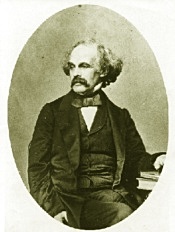 The Ambitious Guest
The Ambitious Guest
by Nathaniel Hawthorne
One September night a family had gathered round their hearth, and piled it high with the driftwood of mountain streams, the dry cones of the pine, and the splintered ruins of great trees that had come crashing down the precipice. Up the chimney roared the fire, and brightened the room with its broad blaze. The faces of the father and mother had a sober gladness; the children laughed; the eldest daughter was the image of Happiness at seventeen; and the aged grandmother, who sat knitting in the warmest place, was the image of Happiness grown old. They had found the “herb, heart’s-ease,” in the bleakest spot of all New England. This family were situated in the Notch of the White Hills, where the wind was sharp throughout the year, and pitilessly cold in the winter–giving their cottage all its fresh inclemency before it descended on the valley of the Saco. They dwelt in a cold spot and a dangerous one; for a mountain towered above their heads, so steep, that the stones would often rumble down its sides and startle them at midnight.
The daughter had just uttered some simple jest that filled them all with mirth, when the wind came through the Notch and seemed to pause before their cottage–rattling the door, with a sound of wailing and lamentation, before it passed into the valley. For a moment it saddened them, though there was nothing unusual in the tones. But the family were glad again when they perceived that the latch was lifted by some traveller, whose footsteps had been unheard amid the dreary blast which heralded his approach, and wailed as he was entering, and went moaning away from the door.
Though they dwelt in such a solitude, these people held daily converse with the world. The romantic pass of the Notch is a great artery, through which the life-blood of internal commerce is continually throbbing between Maine, on one side, and the Green Mountains and the shores of the St. Lawrence, on the other. The stage-coach always drew up before the door of the cottage. The way-farer, with no companion but his staff, paused here to exchange a word, that the sense of loneliness might not utterly overcome him ere he could pass through the cleft of the mountain, or reach the first house in the valley. And here the teamster, on his way to Portland market, would put up for the night; and, if a bachelor, might sit an hour beyond the usual bedtime, and steal a kiss from the mountain maid at parting. It was one of those primitive taverns where the traveller pays only for food and lodging, but meets with a homely kindness beyond all price. When the footsteps were heard, therefore, between the outer door and the inner one, the whole family rose up, grandmother, children, and all, as if about to welcome someone who belonged to them, and whose fate was linked with theirs.
The door was opened by a young man. His face at first wore the melancholy expression, almost despondency, of one who travels a wild and bleak road, at nightfall and alone, but soon brightened up when he saw the kindly warmth of his reception. He felt his heart spring forward to meet them all, from the old woman, who wiped a chair with her apron, to the little child that held out its arms to him. One glance and smile placed the stranger on a footing of innocent familiarity with the eldest daughter.
“Ah, this fire is the right thing!” cried he; “especially when there is such a pleasant circle round it. I am quite benumbed; for the Notch is just like the pipe of a great pair of bellows; it has blown a terrible blast in my face all the way from Bartlett.”
“Then you are going towards Vermont?” said the master of the house, as he helped to take a light knapsack off the young man’s shoulders.
“Yes; to Burlington, and far enough beyond,” replied he. “I meant to have been at Ethan Crawford’s tonight; but a pedestrian lingers along such a road as this. It is no matter; for, when I saw this good fire, and all your cheerful faces, I felt as if you had kindled it on purpose for me, and were waiting my arrival. So I shall sit down among you, and make myself at home.”
The frank-hearted stranger had just drawn his chair to the fire when something like a heavy footstep was heard without, rushing down the steep side of the mountain, as with long and rapid strides, and taking such a leap in passing the cottage as to strike the opposite precipice. The family held their breath, because they knew the sound, and their guest held his by instinct.
“The old mountain has thrown a stone at us, for fear we should forget him,” said the landlord, recovering himself. “He sometimes nods his head and threatens to come down; but we are old neighbors, and agree together pretty well upon the whole. Besides we have a sure place of refuge hard by if he should be coming in good earnest.”
Let us now suppose the stranger to have finished his supper of bear’s meat; and, by his natural felicity of manner, to have placed himself on a footing of kindness with the whole family, so that they talked as freely together as if he belonged to their mountain brood. He was of a proud, yet gentle spirit–haughty and reserved among the rich and great; but ever ready to stoop his head to the lowly cottage door, and be like a brother or a son at the poor man’s fireside. In the household of the Notch he found warmth and simplicity of feeling, the pervading intelligence of New England, and a poetry of native growth, which they had gathered when they little thought of it from the mountain peaks and chasms, and at the very threshold of their romantic and dangerous abode. He had travelled far and alone; his whole life, indeed, had been a solitary path; for, with the lofty caution of his nature, he had kept himself apart from those who might otherwise have been his companions. The family, too, though so kind and hospitable, had that consciousness of unity among themselves, and separation from the world at large, which, in every domestic circle, should still keep a holy place where no stranger may intrude. But this evening a prophetic sympathy impelled the refined and educated youth to pour out his heart before the simple mountaineers, and constrained them to answer him with the same free confidence. And thus it should have been. Is not the kindred of a common fate a closer tie than that of birth?
The secret of the young man’s character was a high and abstracted ambition. He could have borne to live an undistinguished life, but not to be forgotten in the grave. Yearning desire had been transformed to hope; and hope, long cherished, had become like certainty, that, obscurely as he journeyed now, a glory was to beam on all his pathway-though not, perhaps, while he was treading it. But when posterity should gaze back into the gloom of what was now the present, they would trace the brightness of his footsteps, brightening as meaner glories faded, and confess that a gifted one had passed from his cradle to his tomb with none to recognize him.
“As yet,” cried the stranger–his cheek glowing and his eye flashing with enthusiasm–“as yet, I have done nothing. Were I to vanish from the earth tomorrow, none would know so much of me as you: that a nameless youth came up at nightfall from the valley of the Saco, and opened his heart to you in the evening, and passed through the Notch by sunrise, and was seen no more. Not a soul would ask, ‘Who was he? Whither did the wanderer go?’ But I cannot die till I have achieved my destiny. Then, let Death come! I shall have built my monument!”
There was a continual flow of natural emotion, gushing forth amid abstracted reverie, which enabled the family to understand this young man’s sentiments, though so foreign from their own. With quick sensibility of the ludicrous, he blushed at the ardor into which he had been betrayed
“You laugh at me,” said he, taking the eldest daughter’s hand, and laughing himself. “You think my ambition as nonsensical as if I were to freeze myself to death on the top of Mount Washington, only that people might spy at me from the country round about. And, truly, that would be a noble pedestal for a man’s statue!”
“It is better to sit here by this fire,” answered the girl, blushing, “and be comfortable and contented, though nobody thinks about us.”
“I suppose,” said her father, after a fit of musing, “there is something natural in what the young man says; and if my mind had been turned that way, I might have felt just the same. It is strange, wife, how his talk has set my head running on things that are pretty certain never to come to pass.”
“Perhaps they may,” observed the wife. “Is the man thinking what he will do when he is a widower?”
“No, no!” cried he, repelling the idea with reproachful kindness. “When I think of your death, Esther, I think of mine, too. But I was wishing we had a good farm in Bartlett, or Bethlehem, or Littleton, or some other township round the White Mountains; but not where they could tumble on our heads. I should want to stand well with my neighbors and be called Squire, and sent to General Court for a term or two; for a plain, honest man may do as much good there as a lawyer. And when I should be grown quite an old man, and you an old woman, so as not to be long apart, I might die happy enough in my bed, and leave you all crying around me. A slate gravestone would suit me as well as a marble one–with just my name and age, and a verse of a hymn, and something to let people know that I lived an honest man and died a Christian.”
“There now!” exclaimed the stranger; “it is our nature to desire a monument, be it slate or marble, or a pillar of granite, or a glorious memory in the universal heart of man.”
“We’re in a strange way, tonight,” said the wife, with tears in her eyes. “They say it’s a sign of something, when folks’ minds go a-wandering so. Hark to the children!”
They listened accordingly. The younger children had been put to bed in another room, but with an open door between, so that they could be heard talking busily among themselves. One and all seemed to have caught the infection from the fireside circle, and were outvying each other in wild wishes, and childish projects, of what they would do when they came to be men and women. At length a little boy, instead of addressing his brothers and sisters, called out to his mother.
“I’ll tell you what I wish, mother,” cried he. “I want you and father and grandma’m, and all of us, and the stranger too, to start right away, and go and take a drink out of the basin of the Flume!”
Nobody could help laughing at the child’s notion of leaving a warm bed, and dragging them from a cheerful fire, to visit the basin of the Flume–a brook, which tumbles over the precipice, deep within the Notch. The boy had hardly spoken when a wagon rattled along the road, and stopped a moment before the door. It appeared to contain two or three men, who were cheering their hearts with the rough chorus of a song, which resounded, in broken notes, between the cliffs, while the singers hesitated whether to continue their journey or put up here for the night.
“Father,” said the girl, “they are calling you by name.”
But the good man doubted whether they had really called him, and was unwilling to show himself too solicitous of gain by inviting people to patronize his house. He therefore did not hurry to the door; and the lash being soon applied, the travellers plunged into the Notch, still singing and laughing, though their music and mirth came back drearily from the heart of the mountain.
“There, mother!” cried the boy, again. “They’d have given us a ride to the Flume.”
Again they laughed at the child’s pertinacious fancy for a night ramble. But it happened that a light cloud passed over the daughter’s spirit; she looked gravely into the fire, and drew a breath that was almost a sigh. It forced its way, in spite of a little struggle to repress it. Then starting and blushing, she looked quickly round the circle, as if they had caught a glimpse into her bosom. The stranger asked what she had been thinking of.
“Nothing,” answered she, with a downcast smile. “Only I felt lonesome just then.”
“Oh, I have always had a gift of feeling what is in other people’s hearts,” said he, half seriously. “Shall I tell the secrets of yours? For I know what to think when a young girl shivers by a warm hearth, and complains of lonesomeness at her mother’s side. Shall I put these feelings into words?”
“They would not be a girl’s feelings any longer if they could be put into words,” replied the mountain nymph, laughing, but avoiding his eye.
All this was said apart. Perhaps a germ of love was springing in their hearts, so pure that it might blossom in Paradise, since it could not be matured on earth; for women worship such gentle dignity as his; and the proud, contemplative, yet kindly soul is oftenest captivated by simplicity like hers. But while they spoke softly, and he was watching the happy sadness, the lightsome shadows, the shy yearnings of a maiden’s nature, the wind through the Notch took a deeper and drearier sound. It seemed, as the fanciful stranger said, like the choral strain of the spirits of the blast, who in old Indian times had their dwelling among these mountains, and made their heights and recesses a sacred region.
There was a wail along the road, as if a funeral were passing. To chase away the gloom, the family threw pine branches on their fire, till the dry leaves crackled and the flame arose, discovering once again a scene of peace and humble happiness. The light hovered about them fondly, and caressed them all. There were the little faces of the children, peeping from their bed apart, and here the father’s frame of strength, the mother’s subdued and careful mien, the high-browed youth, the budding girl, and the good old grandam, still knitting in the warmest place. The aged woman looked up from her task, and, with fingers ever busy, was the next to speak.
“Old folks have their notions,” said she, “as well as young ones. You’ve been wishing and planning; and letting your heads run on one thing and another, till you’ve set my mind a-wandering too. Now what should an old woman wish for, when she can go but a step or two before she comes to her grave? Children, it will haunt me night and day till I tell you.”
“What is it, mother?” cried the husband and wife at once.
Then the old woman, with an air of mystery which drew the circle closer round the fire, informed them that she had provided her grave-clothes some years before–a nice linen shroud, a cap with a muslin ruff, and everything of a finer sort than she had worn since her wedding day. But this evening an old superstition had strangely recurred to her. It used to be said, in her younger days, that if anything were amiss with a corpse, if only the ruff were not smooth, or the cap did not set right, the corpse in the coffin and beneath the clods would strive to put up its cold hands and arrange it. The bare thought made her nervous.
“Don’t talk so, grandmother!” said the girl, shuddering.
“Now,” continued the old woman, with singular earnestness, yet smiling strangely at her own folly, “I want one of you, my children- when your mother is dressed and in the coffin–I want one of you to hold a looking-glass over my face. Who knows but I may take a glimpse at myself, and see whether all’s right?”
“Old and young, we dream of graves and monuments,” murmured the stranger youth. “I wonder how mariners feel when the ship is sinking, and they, unknown and undistinguished, are to be buried together in the ocean–that wide and nameless sepulchre?”
For a moment, the old woman’s ghastly conception so engrossed the minds of her hearers that a sound abroad in the night, rising like the roar of a blast, had grown broad, deep, and terrible, before the fated group were conscious of it. The house and all within it trembled; the foundations of the earth seemed to be shaken, as if this awful sound were the peal of the last trump. Young and old exchanged one wild glance, and remained an instant, pale, affrighted, without utterance, or power to move. Then the same shriek burst simultaneously from all their lips.
“The Slide! The Slide!”
The simplest words must intimate, but not portray, the unutterable horror of the catastrophe. The victims rushed from their cottage, and sought refuge in what they deemed a safer spot–where, in contemplation of such an emergency, a sort of barrier had been reared. Alas! they had quitted their security, and fled right into the pathway of destruction. Down came the whole side of the mountain, in a cataract of ruin. Just before it reached the house, the stream broke into two branches–shivered not a window there, but overwhelmed the whole vicinity, blocked up the road, and annihilated everything in its dreadful course. Long ere the thunder of the great Slide had ceased to roar among the mountains, the mortal agony had been endured, and the victims were at peace. Their bodies were never found.
The next morning, the light smoke was seen stealing from the cottage chimney up the mountain side. Within, the fire was yet smouldering on the hearth, and the chairs in a circle round it, as if the inhabitants had but gone forth to view the devastation of the Slide, and would shortly return, to thank Heaven for their miraculous escape. All had left separate tokens, by which those who had known the family were made to shed a tear for each. Who has not heard their name? The story has been told far and wide, and will forever be a legend of these mountains. Poets have sung their fate.
There were circumstances which led some to suppose that a stranger had been received into the cottage on this awful night, and had shared the catastrophe of all its inmates. Others denied that there were sufficient grounds for such a conjecture. Wo for the high-souled youth, with his dream of Earthly Immortality! His name and person utterly unknown; his history, his way of life, his plans, a mystery never to be solved, his death and his existence equally a doubt! Whose was the agony of that death moment?
Nathaniel Hawthorne (1804-1864)
The Ambitious Guest
fleursdumal.nl magazine
More in: #Short Stories Archive, Archive G-H
 Ben jij het poëzietalent van het jaar 2017?
Ben jij het poëzietalent van het jaar 2017?
Jouw gedicht in een dichtbundel? Dat kan! Doe mee aan de dichtwedstrijd Doe Maar Dicht Maar. Je hoeft geen doorgewinterd dichter te zijn om mee te doen. Je hoeft ook geen ‘klassiek’ gedicht te schrijven; een rap of een songtekst mag ook! Laat dus vooral je fantasie de vrije loop.
Poëziepaleis zoekt talent!
Kun jij goed schrijven? Ben jij creatief met woorden en heb je gevoel voor dichten, rappen of songteksten schrijven? Doe dan gauw mee met de dichtwedstrijd Doe Maar Dicht Maar. De honderd beste gedichten winnen een plekje in een mooie dichtbundel!
Hoe kun je meedoen?
Stuur voor 5 februari 2017 maximaal 3 gedichten in van elk maximaal 24 regels via het wedstrijdformulier. Vanzelfsprekend schrijf jij deze gedichten zelf; plagiaat is verboden! Omdat er duizenden gedichten worden ingestuurd, krijgen alleen de honderd winnaars begin mei 2016 bericht. De uitslag komt half mei op de website te staan.
 Wanneer mag je meedoen?
Wanneer mag je meedoen?
– Je bent 12 t/m 18 jaar;
– Je spreekt en schrijft Nederlands;
– Je zit op het VMBO/ Havo/ VWO/ ROC of MBO;
– Je zit op de eerste t/m de derde graad van het secundair onderwijs in België.
Wat kun je winnen?
Van de duizenden inzendingen worden 100 gedichten gekozen die een plekje in de dichtbundel Doe Maar Dicht Maar 2015/2016 krijgen. De tien allerbeste dichters, vijf winnaars uit de leeftijdscategorie 12 t/m 14 jaar en vijf winnaars uit de leeftijdscategorie 15 t/m 18 jaar, krijgen een uniek cadeau met hun gedicht erop. De winnaars uit deze categorieën winnen een hoofdprijs!
Wil je tips voor het schrijven van gedichten? Neem dan een kijkje bij Tips & Inspiratie.
# Meer te vinden op de website van het poëziepaleis
fleursdumal.nl magazine
More in: - Book Lovers, Art & Literature News, Children's Poetry, MODERN POETRY, POETRY ARCHIVE
 Kinderen en poëzie 2017
Kinderen en poëzie 2017
Kinderen en Poëzie is een landelijke dichtwedstrijd voor kinderen van 6 t/m 12 jaar die het leuk vinden om gedichten te schrijven. Je kunt deelnemen via school, maar je kunt ook thuis of op de BSO een gedicht schrijven en dat insturen. Vul het wedstrijdformulier in of stuur je gedicht per post. Vraag je ouders, juf of meester om je te helpen als je het niet snapt.
Wanneer mag je meedoen?
– Als je 6 t/m 12 jaar oud bent;
– Als je in groep 3 t/m 8 van de basisschool zit;
– Als je op het speciaal onderwijs zit; je mag dan zelfs meedoen als je ouder bent dan 12. Geef dit dan aan bij opmerkingen op het wedstrijdformulier.
Hoe kun je meedoen?
Stuur voor 5 februari 2017 maximaal drie zelfbedachte gedichten in. Gedichten in braille, een groepsgedicht of een gedicht in een andere taal (stuur wel even een vertaling mee) zijn ook welkom. Alles wat je maar wilt, zolang het maar zelfverzonnen en -geschreven is!
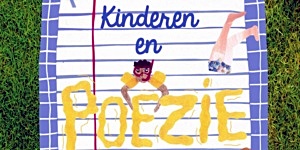 Wanneer mag je meedoen?
Wanneer mag je meedoen?
– Als je 6 t/m 12 jaar oud bent;
– Als je in groep 3 t/m 8 van de basisschool zit;
– Als je op het speciaal onderwijs zit; je mag dan zelfs meedoen als je ouder bent dan 12. Geef dit dan aan bij opmerkingen op het wedstrijdformulier.
Wat kun je winnen?
Als je meedoet aan de wedstrijd kun je leuke prijzen winnen, waaronder een plekje in een echte dichtbundel. Je maakt ook kans op één van de twee hoofdprijzen. Er is een hoofdprijs voor de middenbouw en een hoofdprijs voor de bovenbouw. Daarnaast is er ook nog een speciale prijs van de Kinderjury. Genoeg redenen om mee te doen dus!
Poëziepaleis zoekt talent!
Kinderen van 6 t/m 12 jaar
Wil je tips voor het schrijven van gedichten? Neem dan een kijkje bij tips & Inspiratie.
# Meer informatie op website poëziepaleis
fleursdumal.nl magazine
More in: - Book Lovers, Art & Literature News, Children's Poetry, MODERN POETRY
Thank you for reading Fleurs du Mal - magazine for art & literature